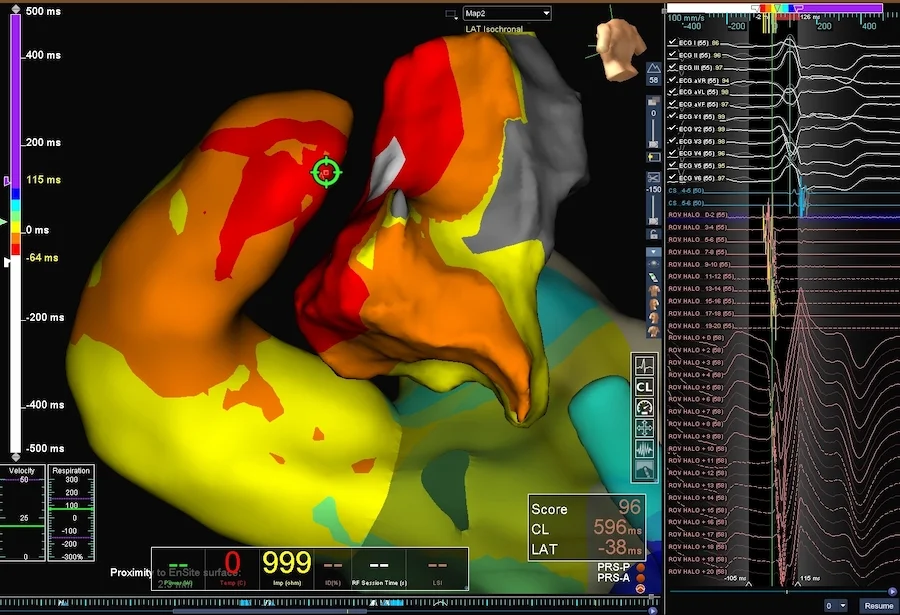What is ventricular extrasystole?
Ventricular extrasystoles (also called ventricular premature beats or PVCs) is a premature heartbeat that originates in the ventricle, the area of the heart called the ventricle. It can occur in a person without structural heart disease. It can also accompany serious structural heart disease. Patients with ventricular extrasystoles may feel a misfire or irregular heartbeat. They can be treated with medication or ablation.
How common are ventricular premature beats?
Ventricular premature beats are more common in older people with concomitant heart disease. The longer you follow your heart rhythm, the more likely you are to see it. If you keep a person without structural heart disease connected to ECG for 30-60 seconds, you will see extrasystoles with a frequency of 1%. If you do 24-hour Holter monitoring, you can see very few premature beats in the vast majority of normal people. What is important is how frequent the extrasystole is and where in the heart it originates. In 24-hour rhythm recording, the frequency of seeing premature beats more than 20% of the total heart beats is 2%.
What are the symptoms of ventricular extrasystole?
Most of them do not cause complaints. Roughly, the most common complaints are the following;
- Palpitation sensation
- Misfire sensation
- Feeling a strong heartbeat after extrasystole
- Dizziness, rarely fainting.
- If frequent ventricular extrasystoles occur in patients with severe structural heart disease, they can cause low blood pressure.
In the figure below you can see a ventricular premature beat (PVCs) mapped with the 3D mapping system. The white areas show the focus of the rhythm problem.
Do extrasystoles enlarge the heart? Does it tire the heart?
Extrasystoles sometimes lead to what we call heart failure. The risk increases especially if the number of PVC is more than 10-20% of the total number of heart beats, if it originates from a focus near the outside of the heart, and if it is accompanied by a rhythm disorder called ventricular tachycardia.
How soon does extrasystole enlarge the heart?
There is no clear answer to this question. Although some studies suggest that it takes years for heart failure to develop due to PVCs, animal studies have shown that heart failure can develop even in early periods (2-4 weeks).
Can PVCs cause heart to stop?
Sudden cardiac arrest can occur in extrasystoles caused by the conduction system network in the heart. The medical name is ventricular tachycardia or ventricular fibrillation. Again, there are muscles inside the heart to which the valves are attached with strings like parachutes. Premature beats from these muscles can also cause sudden cardiac arrest.
In patients with structural heart disease or extrasystoles that come very close to the previous normal heart beat, especially immediately after the previous normal heart beat, may also pose a risk of cardiac arrest. In electrical abnormalities of the heart, such as Long QT, Short QT or Brugada syndrome, extrasystoles can trigger more serious arrhythmias.

What happens if ventricular premature beats are not treated?
This is one of the most curious questions. If ventricular premature beats are not treated, their number may increase, stay the same or decrease. There is no way to predict this. Premature beats, especially those that are more frequent at rest and decrease when walking, tend to decrease over time. Otherwise it is difficult to predict.
The important point is that some premature beats may pose a risk to life and cause impaired heart function.
Not all premature beats, but those with certain characteristics can cause more serious, life-threatening rhythm disturbances in the heart called ventricular tachycardia (VT) or ventricular fibrillation (VF).
Extrasystoles (premature beats) can also disrupt the dynamics of heart contraction and create a risk of heart failure. They are particularly risky in terms of their potential to cause heart failure if your premature beats are numerous, cause a wide QRS on the ECG and if your premature beats originate from outside the heart wall.

Reference: Ventricular extrasystoles
Update: Feb 13, 2024
